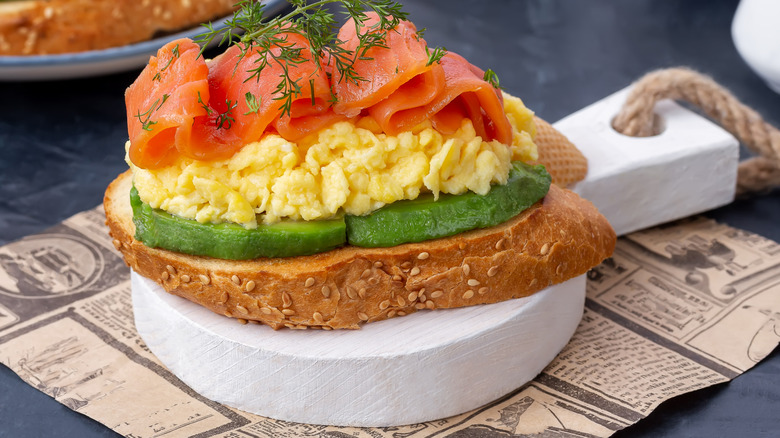When You Should Be Seasoning Scrambled Eggs For Optimum Flavor
What is brunch without scrambled eggs? While the beloved breakfast dish only takes a few minutes to make, it can be hard to achieve that perfectly soft, fluffy texture. So many things can go wrong: Overcook them, and you may get rubbery eggs. Undercook them, and you have runny eggs. Even adding seasonings at the wrong time can result in less than perfect eggs, some experts say.
To determine when to add your seasonings, it helps to understand what happens when you scramble eggs. Think of each egg as a science experiment. After all, you may have noticed that different cooking methods have radically different effects on the texture of an egg — just picture over-easy eggs versus hard-boiled eggs. An egg white is mostly proteins suspended in water, resulting in a gel-like texture when cooked. When eggs are beaten, whisked, and cooked, the proteins move around and bond with each other, The Exploratorium explains. If overcooked, the proteins form more bonds (and stronger ones, at that), resulting in the dreaded rubbery scrambled eggs. Can adding your seasonings at a certain time prevent this from happening?
Cook time is more important than seasoning time
Foodies are divided on whether it is better to salt your eggs before, during, or after the cooking process. During a demonstration on Season 8, Episode 5 of "MasterChef," Gordon Ramsey explained his famous scrambled egg technique. He urged the chefs to avoid adding salt and pepper too early, since that can cause the eggs to "go gray and turn watery." Instead, he suggests seasoning at the end.
Not everyone agrees with Ramsay's method. America's Test Kitchen recommends salting the raw eggs before scrambling them, arguing that "salt dissolves egg proteins so that they're unable to bond as tightly when cooked," resulting in tenderness. However, Daniel Gritzer of Serious Eats put both of these techniques (and three others) to the test and found there to be an almost "indistinguishable" difference between eggs that were salted an hour, 30 minutes, 15 minutes, 5 minutes, and 0 minutes before cooking. Ultimately, you may need to conduct your own experiments to see which method you prefer.
Whether you season your eggs before, during, or after cooking, Sauder's Eggs recommends using both salt and pepper, since the salt "suppresses bitter tastes" while the pepper adds a little heat. You can also add many of your other favorite flavors after cooking, including sliced scallions, salsa, or some of the secret ingredients celebrity chefs use in their scrambled eggs.

